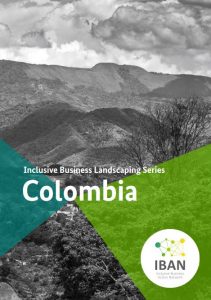Stocktaking of Inclusive Business ventures in South Africa, Namibia, Colombia and Mexico
A promising approach for development…
Inclusive business is one of the buzz words that excites more and more people from the development community. Despite the global enthusiasm, there are still challenges to tackle on a local and regional level. Research is needed that identifies and describes the inclusive business landscapes and that explores the potential for further inclusive business growth in developing countries. Therefore, the Inclusive Business Action Network (IBAN) has launched the Inclusive Business Landscaping Studies which can be found on our publication site. This short and practical research series provides an overview of the status quo of the inclusive business ecosystem in different countries. The first four studies were written in 2014 and provide an overview of inclusive business ventures, support organisations and incentive programmes in Colombia, Mexico, South Africa and Namibia.
Similar but still different
One fact that applies to all four countries is that the concept hasn’t reached its full potential yet. There is a general confusion of labels, including corporate social responsibility (CSR), corporate citizenship or social business. This makes it difficult for practitioners and researchers to identify cases where the logic of inclusive business is in operation. Despite these difficulties the landscaping studies reveal some interesting country specific insights on opportunities for inclusive business. Here are some the key insights in short:
South Africa – leading the way to a more inclusive economy
Compared to other countries from the landscaping series, the inclusive business landscape is relatively mature in South Africa. Even though companies have historically focused rather on CSR approaches, the country has the highest number of inclusive business models across different sectors as well as a high number of organisations that support their development. There is a buzzing eco-system of incubators, challenge funds and other private and public players. The biggest, yet untapped potential for inclusive business solutions is in the areas of retail and consumer goods, education, financial services and ICT. Restraints for inclusive business development are persistent infrastructure challenges, insufficient understanding of low-income individuals and their potential roles along the value chain.
Namibia – fertile ground for inclusive business development
In contrast to South Africa, the Landscaping Study describes the status of inclusive business in Namibia as “embryonic”. Unlike in some Asian countries like India, Namibia doesn’t have jurisdictions on CSR, which happens merely on a voluntary basis. There are great inequalities between urban and rural areas as well as high poverty and unemployment rates. Additionally, South African products and companies dominate the Namibian economy. In order to strengthen the domestic economy, the Namibian government puts strong efforts in empowering native products and companies of native black Namibians who have been underprivileged under South African rule. This creates good conditions and fertile ground for inclusive business ventures and for small and medium enterprises. Still, there needs to be greater awareness on inclusive business, improved access to finance and implementation support as well as incentives in terms of regulatory frameworks.
Colombia and Mexico – Private or public sector domination?
In Colombia and Mexico the situation for inclusive businesses is relatively similar. In both countries the support ecosystems have reached a relatively high level of maturity: Foundations, non-profit and civil society organisations function as key actors linking low-income communities and the private sector. Investors that provide funding and support have a strong presence, though they often focus on social enterprises. Additionally, the governments of both countries promote the concept; Colombia having even a National Strategy on Inclusive Business. In both countries large companies dominate the inclusive business landscape: half of the Colombian and almost two-third of the Mexican inclusive businesses emerged from initiatives of large companies. Another trend that characterises the Mexican and Colombian inclusive business landscape is that low-income communities play mostly the role of suppliers or clients instead of producers.
The needs for action in these countries differ slightly. In Mexico, there is an excess of uncritical perspectives that merely broadcast the concept, and show only the company perspective of inclusive business. Therefore, there is a strong need to draw a more refined picture which takes into account the perspectives of fundamental partners and low-income communities. Meanwhile in Colombia the inclusive business agenda needs to be developed side by side with the government’s vision for a post-conflict Colombia.
Read the full reports



